Cuba at the Rosa Luxemburg Conference

Cuba at the Rosa Luxemburg Conference
It’s Possible to Build a Socialist State of Law and Social Justice
Young Cuban deputy Yoerky Sánchez, a member of the Council of State and director of Juventud Rebelde newspaper, spoke on Saturday at the Rosa Luxemburg Conference in Berlin
Posted: Saturday 11 January 2020 | 09:41:29 pm. Updated: Saturday 11 January 2020 | 10:24:36 pm.
by Juventud Rebelde digital@juventudrebelde.cu
Translated and edited by Walter Lippmann for CubaNews.

Cuban deputy Yoerky Sanchez, member of the Council of State and director of Juventud Rebelde, explained to those present the measures that the United States is unleashing against Cuba. Author: Cuban Embassy in Berlin Published: 11/01/2020 | 09:31 pm
“Cuba shows that it is possible to build a socialist state of law and social justice, democratic, independent and sovereign, organized with all and for the good of all. Deputy Yoerky Sánchez Cuellar, on behalf of Cuba, explained that at the Rosa Luxemburg 2020 International Conference held on Saturday, January 11, in Berlin.
Invited by Junge Welt, a Marxist-oriented newspaper in German-speaking countries and a faithful ally of the Cuban struggle against the US blockade, Sanchez is also director of Juventud Rebelde laid out to those present the harsh economic pressures that the northern nation imposed on the Caribbean country in 2019. They reached a rate of one measure every seven days.
These measures, which included a strong communication factor, such as the campaign to discredit the Cuban medical collaborators, are a follow-up of the Blockade policy that the US government has maintained against the Caribbean country for 60 years. Sanchez explained: “The effect of this amounts to more than 138.8 billion dollars at current prices (…) It constitutes the main obstacle to the development of our nation,” said the Cuban deputy. “There is no sector of Cuban life that is unaware of the impact of this genocidal policy.

However, he said, “in the midst of the vicissitudes and deficiencies, Cuba exhibits a successful social model.
Likewise, referring to the destabilizing actions of the United States in the entire Latin American region, the Cuban congress member presented the recent events in Bolivia and Brazil as proof of the reactionary right’s attack on the continent’s progressive processes. He stated that the US government sells the neo-liberal model as a panacea and “demonizes anyone who confronts its dictates”.
Referring to Cuba’s position on issues such as the sovereignty of nations and the right to opt for a socialist system, the young Cuban said, “We advocate the right of each nation to determine its own political, economic, social and cultural system, without external interference or pressure. In this way, we reject the pretensions of Western powers to impose a single model of democracy, because this is not the patrimony of any country or region,” while assuring that Cuba “does not export its democratic model or try to give formulas to anyone.”

However, he emphasized, fidelity to our principles continues. “What we will never change is the will to continue building socialism.”
In this way, the voice and principles of Cuba were heard in an event in which intellectuals, politicians, scientists and artists from Europe, the United States, Latin America and the Middle East participate. Under the slogan Street Power – Struggle for the Future – Answering the Question of the System, is the largest conference of the left in Europe.
As in the 2019 edition, this 25th Rosa Luxemburg International was the scene of a demonstration of solidarity with the peoples of Latin America, including Cuba, Venezuela and in particular Bolivia.
Prior to his speech at the important event, the Cuban deputy held a meeting with representatives of leftist organizations in Germany. He thanked them on behalf of his country for the support provided in the fight against the bloody blockade of the island.

Dictator of the World
Dictator of the World

By Manuel E. Yepe
http://manuelyepe.wordpress.com/
Exclusive for the daily POR ESTO! of Merida, Mexico.
Translated and edited by Walter Lippmann.
In his July 4 speech to Congress in 1821, U.S. Secretary of State John Quincy Adams said that if the United States were to abandon its then non-interventionist foreign policy, it would inevitably become the “dictatorship” of the world and begin to behave accordingly.
Political scientist Jacob G. Hornberger, founder and president of the “Future of Freedom” foundation, wrote on May 10 of last year that he finished a major journalistic work entitled “The Dictatorship of the World” in which he wrote that it cannot be denied that that prediction of J.Q. Adams has become a reality.
The United States has truly become the dictatorship of the world, an arrogant, ruthless and brutal dictatorship that tolerates no dissent from anyone on earth.
“I use the term America now because that’s what Adams originally used, but in reality, it’s the United States government that has become the dictatorship of the world,” says Hornberger. A good example of this phenomenon occurred when, at the beginning of the last century, the world’s dictatorship applied its cruel system of sanctions against Cuba with vengeful ends and has maintained it to this day.
It is unfair enough to punish innocent foreign citizens with death or impoverishment for the sake of a political objective. But it is also important to note that the sanctions are an attack on the economic freedom of the American people because they involve sanctions against the American citizens involved.
If an American trades with an Iranian, a Cuban or a Venezuelan, the world’s dictator threatens, pursues and convicts him or her with vindictive intent, through criminal prosecution, civil fines, or both.
A similar system of sanctions has been applied during the 1990s against Iraq, killing hundreds of thousands of Iraqi children from the Arab world. The sanctions were.
That did not bother the dictator, at least not enough to end those sanctions. The idea was that if a large enough number of children could be killed, Iraqi dictator Saddam Hussein would either abdicate in favor of a U.S.-approved dictator, or there would be a coup d’état or violent revolution that would accomplish the same thing.
U.S. Ambassador to the UN Madeleine Albright expressed the dictatorship’s official view when she announced that the death of half a million Iraqi children from sanctions “was worth it”.
Another example of this was the case of Meng Wanzhou, a Chinese citizen working as the financial director of the giant Chinese technology company Huawei. After being arrested by Canadian authorities and placed under house arrest, she suffered the wrath of the world’s dictatorship.
What was her alleged crime? Having violated US sanctions against Iran? What do US sanctions against Iran have to do with China? Exactly nothing! She’s a Chinese citizen, not an American. Then why was she being prosecuted by the United States government?
Sanctions have become a regular tool of US foreign policy. Hardly anyone cares about their imposition and enforcement. Their aim is to threaten foreign entities and citizens with death, suffering and economic deprivation. Its goal is to bend their governments to the will of the American dictator and her violent and brutal agents.
What could be more violent and ruthless than threatening innocent people with death and impoverishment as a way of reaching their governments? It is well known that most citizens of the world have little control over the actions of their governments,. U.S. citizens have little control over the actions of their government. What is the morality in punishing innocent citizens as a way of achieving a political objective? That is precisely why terrorism is condemned.
Washington is not content to demand that its citizens comply with its evil system. In its role as global dictator, the federal government requires everyone to comply with its evil system. The dictatorship claims world jurisdiction for itself.
Why are innocent foreign citizens the target of death and economic suffering simply because the
Why do U.S. officials not like their government? Why are the freedoms of U.S. citizens being destroyed for the same reason? And why are foreign citizens around the world criminally prosecuted for violating the federal government’s evil penalty system?
December 25, 2019.
To 2020, Let’s Go Forward!

To 2020, Let’s Go Forward!
For young people, as for all of Cuba, 2019 has been a singular year, of many efforts, but also of surprising results that contribute to projecting new challenges for the immediate future
Published: Saturday 28 December 2019 | 09:52:20 pm
By Mileyda Menéndez Dávila, Odalis Riquenes Cutiño, Liudmila Peña Herrera, Javier Rodríguez Perera, Laura Brunet Portela, Iviani Padín Geroy, Zorileidys Pimentel Miranda, email: digital@juventudrebelde.cu
Translated and edited by Walter Lippmann for CubaNews.

A child is the most beautiful thing you can have in life, says young farmer Hector Prieto Caraballo. Author: Zorileidys Pimentel Miranda Published: 28/12/2019 | 08:37 pm
The 2019 photo gallery is loaded with images that remind us of who we are and what paths we are on. We say “we are” in the present tense, because we understand that what we have experienced during the last 12 months has marked the national sentiment, the spirit and even the geography, in such a way that today, only hours before the arrival of 2020, it is very difficult to say “we were”, because much of what happened this year marks the paths or the roads that we must travel during the coming calendar year.
We must not forget that Cuba is the compilation of our daily poetry wrapped in kisses, sweat or tears, depending on its human beings and their circumstances. Cuba is the reality of each of our realities. Therefore, every achievement, every pending task, every goal – accomplished or to be accomplished – becomes the precedent for the next step.
A more than happy man

Héctor Prieto Caraballo knows this well. Only a month ago, he thought that the greatest happiness was limited to sunrise in the countryside, breathing pure air, working the land and enjoying its fruits.
That meant seeing his father, Héctor Luis Prieto, known as the Havana Man, happy, always glued to the ground to grow the leaves of what many call, not without justified chauvinism, the best tobacco in the world.
“Planting, picking tobacco, making bushes… everything is interesting, but planting is my favorite activity. Seeing that tiny stance grow gives me a very nice feeling because I can appreciate the results of my work,” explains Prieto Caraballo, a graduate of Técnico Medio en Agronomía.
But since last November 22nd, he knows that happiness is not only wrapped in green leaves, but it is also in the form of crying, gurgling, smiles, future. Happiness photography has a new and beloved face for the young man from Pinar del Rio.
“It is incredible the power that a smile of his has. A child is the most beautiful thing you can have in life,” he says proudly, adding, “I feel like a more than happy man. This is a year I will never forget: my first child, my family, the results in production. Everything has been very good for me.
Creativity in the face of obstacles
The same cannot be said of the promoters of restaurants in Havana, cocotaxi drivers or other means of transport dedicated to tourism, room renters and business owners who were affected in 2019 by the intensification of hostile measures by the United States government towards Cuba.
For them, this has been the year of economic cutbacks, of mutilated profits, of applying creativity as a solution to the ban on U.S. cruise ship travel to the Greater Antilles. This is how Raidel Regaiferos Sánchez feels -because he has lived it-. He has been working for more than a year as a promoter of the restaurant Habana Boulevard, in the capital city.
“When I started working here, the restaurant was full almost all the time, like the rest of this type in Old Havana. But when Trump decided to have the cruise ships say goodbye to the harbor in the bay, many of the promoters changed jobs, since the pay depends on the consumption by the diners who come to the restaurant.
Faced with such a complex panorama, which translates into less income for the development of the non-state sector. Though Trump says that every measure tries to [only] affect the Cuban government, Raidel and his colleagues have no other option but to appeal to creativity and the reformulation of commercial strategies in order to “fall in love” with clients and not close the deal.
“Since then, we’ve had to update prices and update the menu, as well as implement other alternatives when it comes to promoting the site, and adding national consumers”. He says who would be happy if 2020 would bring longed-for opportunities to prosper, without measures “from outside” that attempt to destabilize “inside.”
Hope for many

Still in young Martha Regla Beltrán Boza’s memory is the devastating tornado that destroyed her home.
Photo: Mileyda Menéndez Dávila
Martha Regla Beltran Boza believed that 2019 would be the worst year for her and her family. They’re known as “the Many” because it is a nucleus with 24 people from three generations, all born and raised on the slopes of Lenin Hill, in Regla.
On the night of January 27, Martha had gone out to the street because she wanted to eat peanuts, but something in the air disturbed her and she ran back to bed with her mother. Minutes later, the roofs of the tiny wooden house fell on them, and behind them a nearby Yagruma tree, uprooted by the strong winds of the tornado that destroyed several areas in five municipalities of the capital.
“Now the family was really out on the streets,” he thought. Fortunately, a neighbor provided his small home so that a part of “los Muchos” would be aware of the recovery of the property, taken up by the Julio Antonio Mella contingent, which in this case became practically the entire onstruction, from the foundations, of three two-story masonry houses.
“They made us up to the entrance corridor, which until then was made of earth,” she says with relief. Today, she is in the third year of a pre-university educational program and dreams of soon joining a primary school classroom to teach literature, which is her favorite subject.
The usefulness of virtue
In Santiago de Cuba, the young hands of José Ruberlandis Vázquez Enrys, Sayonara Destrade Castillo and Indira Jardines Durán bear the mark of the effort to be useful in the face of the challenges posed by difficulties. Their energy and enthusiasm have been decisive in promoting the idea of food production parks, a Santiago-based initiative that is already recognized in the country for reproducing the artisanal practices of traditional gastronomy on a large scale, with a minimum of electricity and zero diesel fuel.

“The estate has allowed me to develop in the production of food for the people,” says Indira Jardines Durán. Photo: Odalis Riquenes Cutiño
The alternative came to life in March 2019, in areas of the Ice Cream Wafer Factory. It’s located on Patria Avenue. Saltine cookies of various types and 100% rice cookies, candies of various shapes and flavors, homemade mayonnaise, cakes and pancakes, cassava and cassava frying, peanut and coconut nougats, pru, vinegar, sweet and dry wine, liquors, fruit and hard chilled ice cream, cassava, raspberry, Cuban pasta, instant soda, breads and sweets with flour spreaders. These make up a varied amalgam of products that are highly appreciated by the consumers who receive them. This is both in an Ideal Market and in cafeterias and points of sale in the Santiago food industry. Ruberlandis, Sayonara and Indira feel the satisfaction of having dedicated these last months to producing food for their people, using natural fuel: coal, firewood, bagasse and coconut shells. For them, 2019 can be summed up in two words: to be useful.
A “busy” year

Massiel Cano Garcia says that 2019 was a year to show who today’s young people are. Photo: Laura Brunet Portela
“When the Young Communist League calls, when your university asks for a hand, when the president of the country himself trusts the young people and believes we can do more, then there is no one who is not motivated,” says Massiel Cano Garcia, a student in special education.
A pile of photos he has on his mobile phone show that 2019 was a very busy year: “It was full of proposals and opportunities to show who we are as young people today,” he says.
With his finger, he slides the snapshots of the productive activities that made his University one of the best: planting potatoes in the middle of a field, or giving away smiles at the pediatric hospital.
Massiel keeps memories of all those moments, to show that the energy of his youth is transmitted, transformed and produced. “Watching over the savings in the companies in my neighborhood was something I did to feel useful and help my country move forward,” he recalls.
“It wasn’t a question of reporting to anyone. We didn’t have plans or figures to accomplish in one day. It was just “making us feel”, making those who didn’t know how important it was to save aware of it. And she recalls that Prado went up and down in shops, bakeries, commercial establishments, companies and homes, inspiring people, winning hearts.
“The idea was to convince people that no matter how insignificant it might seem, a simple click also mattered,” says those who now dream of dedicating their lives to special education. “My greatest wish is to be a good teacher for children with special educational needs.
A high jump

For Luis Enrique Zayas, who became a starter at the Pan American Games in Lima, this year has been a sort of Copernican turn in his life. Photo: IAAF
For someone like Luis Enrique Zayas, who several times has considered not giving another drop of sweat for the sport he practices, still young but with several fiascos. This year has been a kind of Copernican turn for his life. With hardly any possibility of participating in the Pan American Games in Lima, almost ten days before their start, he was informed of their presence. Forecasts placed him far from the podium, but in the Peruvian capital the triumphant apotheosis took place.
It was on August 9 when the high jumper shattered all the speculations and became the biggest surprise of the Cuban delegation in Lima. He invaded the summit with the best of his life, a jump of 2.30 meters, three centimeters higher than his previous personal best, achieved in 2016 when, breaking the same predictions, he became the world youth champion.
“I concentrated a lot on the whole competition and that’s how that gold medal came out, something super big for me, my family and Cuban athletics. In the meantime, I qualified for the World Athletics Championships in Doha”, said the athlete from Santiago, who has realised that life is a stage of constant tests and he, as a “good actor”, emerged as a protagonist more than once.
In 2020, looking ahead
Diverse in nuances, complex because of the ups and downs and the obstacles; full of successes and sacrifices… 2019 is falling behind. Once again we close a cycle, but we remain with the list of what we have accomplished or what is still pending, in order to focus our gaze on what we want to mark our life since January 1st, always with the conviction that we hum along with the Buena Fe group: we will receive it “head-on” in 2020.
Chicharrones is Meat

I Still Think That Chicharrones is Meat
Chicharones contain high amounts of collagen and established fats that generally help to reduce cholesterol, diabetes and cardiovascular disease
December 28th, 2019
A CubaNews translation.
Edited by Walter Lippmann.

Experts conclude that chicharrones is a healthy food Author: Twitter Posted: 28/12/2019 | 03:13 pm
Numerous nutritionists, as well as food experts, claim that the delicious deep-firied crackling pork rinds is not only not fattening, but is even beneficial to health and should be included in many diets.
It is said that pork rinds have high amounts of collagen, so when you eat them you will feel full sooner, which will make you eat less and this helps you lose weight.
It is also high in so-called established fat, which helps reduce cholesterol, diabetes and cardiovascular disease, and generally improves bone health. It also contains a lot of protein. One ounce (28 grams) of this food provides 17 grams of protein, which maintains the feeling of satiety and benefits the muscles. On the other hand, it has stearic acid, a saturated fatty acid that does not raise blood cholesterol levels, according to the website Meatinfo.co.
This food, which is eaten in many parts of the world – in Cuba almost all year round – is presumed to have been invented during the 1800s by the working-class communities of Savy in the West Midlands, or the Western Midlands, one of the 47 counties of England, UK, with its capital in Birmingham.
Like almost all fried and salted meat snacks, chicharrones are delicious. Recently, the company Muscle Food released chicharrones that are claimed to have the highest protein content of any chicharrones in the world. Their product is made from fried pork skin sprayed with salt and 70 percent of its nutritional content is protein, plus it has half the fat of pork rinds on the market.
Olympic gold medalist in taekwondo, Jade Jones, is known to like them a lot. And if an Olympic medalist consumes them regularly, it means they’re healthy. Also, according to Vice magazine and Milenio.com, most of the fat in pork rinds is mono and polyunsaturated.
St. George’s Hospital’s chief nutritionist, Cath Collins, confirmed that because what we eat is the collagen concentrated in the pig’s skin, pork rinds have an incredibly high protein content that maintains the feeling of satiety, benefits the muscles and improves bone health.

Chicharrones is not harmful. Photo:taken from Twitter.
It turns out that lard [manteca de cerdo] is healthy
On the other hand, research conducted by Dr Michael Mosley and published by BBC News revealed that what we thought we knew about cooking oils was simply wrong. Most people believe that frying with vegetable oils has to be healthier than cooking with animal fat. The problem is that when fats and oils are heated they change, and in doing so produce chemicals that can cause heart disease or cancer.
Olive oil, for example, has a so-called lower smoke point, which means it will begin to change more quickly. The beneficial compounds then begin to degrade and potentially harmful compounds are formed. Sunflower oil, supposedly the healthier alternative, is much worse. Therefore, lard, so stigmatized in common use, is preferable to these oils in general, experts explain.
Nutritionist Mariana Rodríguez Pineda explains that the tendency to point to certain foods as being fattening — or not — is questionable. Any excess calories consumed in a day can cause us to gain weight, she says. There is no one food that, by itself, will make us gain or lose weight; what matters, after all, is the amount of energy you consume and the amount you spend, she says.
According to Rodríguez Pineda, the belief that chicharrones are not fattening comes from supporters of ketogenic diets, which are characterized by high amounts of protein and fat, and little or no carbohydrates.
Pork rinds, which are of animal origin, are permitted in this type of diet. For all these reasons, Rodriguez assures us that there is no better diet than a balanced one that includes carbohydrates, fats and proteins, since restricting one of the three nutrients can be harmful to health.

Lard is healthy. Photo: taken from twitter.
Tribute to Father Sardiñas

Tribute to Father Sardiñas on the 55th Anniversary of his Passing
With the placing of a floral offering in the name of the Cuban people, and a pilgrimage to his tomb in the Colon Cemetary in Havana, Guillermo Isaías Sardiñas Menéndez, the priest known as the Father of the olive green cassock, was recalled yesterday on the 55th anniversary of his death
——————————————————————————–
Author: National Editor | internet@granma.cu
December 24, 2019 01:12:18
A CubaNews translation.
Edited by Walter Lippmann.
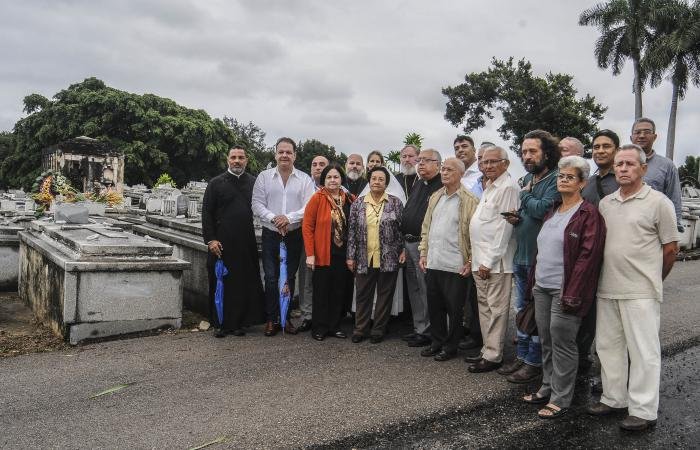
Photo: Dunia Álvarez
With the placing of a floral offering in the name of the People of Cuba and a pilgrimage to his tomb, in the Colon Necropolis, in Havana, the priest Guillermo Isaías Sardiñas Menéndez, known as the Father of the olive green cassock, was evoked yesterday on the 55th anniversary of his death.
Major General José Carrillo Gómez, president of the Association of Combatants of the Cuban Revolution (acrc), highlighted the personality of the former chaplain of the Rebel Army who came down from the Sierra Maestra with the rank of Commander, while Monsignor Ramón Suárez Polcari, chancellor of the Archbishopric of Havana, said a prayer in tribute to this distinguished personality. Also present were Caridad Diego, head of the Office of Attention to Religious Affairs of the Central Committee of the Party, Brigadier General Delsa Esther Puebla Viltre and members of the Association of Combatants of the Cuban Revolution (ACRC), as well as representatives and religious leaders of our country. (National Editor)
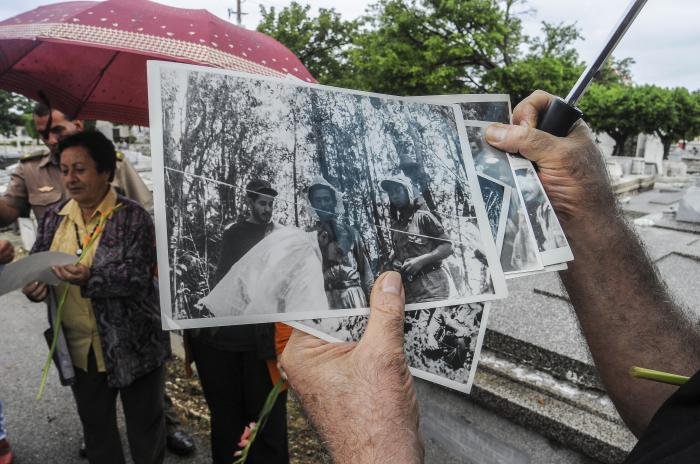
Violence Against Women

Violence against women is much more than physical or sexual
By Amelia Duarte de la Rosa
November 25, 2019
Translated and edited by Walter Lippmann for CubaNews.
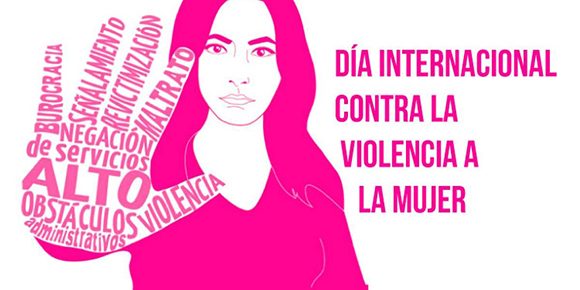
nuevamujer.com
The world commemorates this November 25 International Day for the Elimination of Violence against Women, even though one in three women on the planet suffers physical or sexual violence.
However, the term “Violence Against Women” coined by the UN in 1993, encompasses many types of attacks beyond physical, sexual or psychological, and also has to do with any threatening act, whether it occurs in life public as in private.
Many women in the world suffer from labor and political violence as an inalienable part of gender inequality and lack of equal rights for women and girls.
Among the highest rates of gender violence worldwide are found in the Pacific region, the Middle East and Africa, where although physical or sexual rape has a higher incidence, the female population is unprotected in terms of economic empowerment, political leadership and inclusion.
According to the United Nations Annual Report 2017-2018, women remain trapped in a network of inequalities that place them in the worst part of unpaid care, social protection and insecurity.
Gender disparities also intersect with gaps in education, income and access to services, as well as ethnicity, sexual orientation and geographic location.
In addition, women and girls are particularly vulnerable in education, which prevents them from achieving universal schooling and having more employment opportunities.
Harassment, discrimination at work and psychological aggressiveness also affect them as victims, because women are exposed to strenuous work schedules, low earnings, difficult conditions and an increased risk of violence.
UN Women data shows that one in 10 women in the European Union declares that they have suffered cyber-bullying since the age of 15. This includes unwanted, sexually explicit and offensive emails or SMS [text] messages, or inappropriate and offensive attempts in the social networks, which are positioned as the main means through which this psychological violence is exercised.
Meanwhile, a study conducted in 27 universities in the United States revealed that 23 percent of university students are victims of sexual assault or sexual misconduct.
For its part, Africa is one of the most restrictive continents in terms of women’s rights and it is estimated that millions of them have been subjected to female genital mutilation.
In addition, it leads the ranking as the region with the least safe abortions in the world, followed by Oceania and Latin America, which takes thousands of lives each year.
It is believed that only one in four abortions is carried out in safe conditions.
UN Women implements an aid plan in several countries to close these gender gaps and create counseling centers for survivors of violence.
In addition, some governments develop economic empowerment plans to counter violence against women, such as in Japan, which, for example, approved paternity leave to allow the professional development of mothers.
However, all action continues to seem useless when, UN data confirms that 71 percent of victims of trafficking worldwide are women and girls, and one in two women in 2017 was killed by their sentimental partner or a member of their family.
(Taken from PL)
The Siege of Túpac Katari

The Siege of Túpac Katari
On November 15, 238 years had passed since the dismemberment of the Bolivian indigenous leader. Along with thousands of his followers, he surrounded the city of Nuestra Señora de la Paz [today’s La Paz] for several months creating chaos and sowing panic among the Spaniards who lived in the small city
November 20, 2019
Translated and edited by Walter Lippmann for CubaNews.
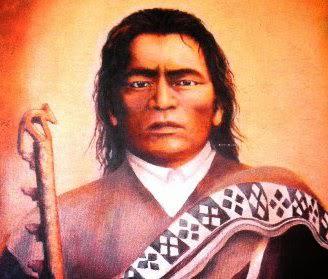
Portrait made by Gastón Ugalde and located in the Legislative Palace, in La Paz. Photo: Taken from the Internet
November 15, marked 238 years since the dismemberment of the Bolivian indigenous leader Túpac Katari. Together with thousands of his followers, he surrounded the city of La Paz for several months, creating chaos and sowing panic among the Spaniards and their descendants who inhabited In the small town.
Before dying, Katari formulated this prophecy: “I will die but I will return and be millions.” The historic phrase was rescued by Aymara leader Evo Morales when he assumed the presidency of Bolivia in 2006, and his government began to work for the demands for the rights of the original peoples.
Katari’s real name was Julian Apaza Nina. He was born in 1750 in the Aymara community of Ayo Ayo, province of Sica Sica, near La Paz, the son of a miner who died in the mines of Potosí. This indigenous leader led one of the most important rebellions against Spanish colonialism in Upper Peru, along with his wife, the heroine Bartolina Sisa and her younger sister Gregoria Apaza.

The heroine Bartolina Sisa, wife of Túpac Katari. Photo: Internet
Legend has it that when Julian was born in 1750, two huge condors settled in the nearby mountains. One represented the Aymara and the other, the Quechua. Thus they learned that this child would be very important for the two native communities. That’s what happened.
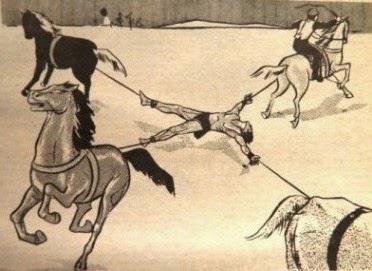
The young Julian adopted the pseudonym of Túpac Katari in tribute to the indigenous leaders Túpac Amaro II and Tomás Katari, to fight against Spanish domination, organizing the indigenous and mestizos for the great rebellion he was preparing.
An army of more than 40,000 indigenous people from different regions such as Calamarca, Caracato, Sapahaqui, Laja and Viacha, led by Tupac Katari, twice surrounded the city of La Paz in 1781. Their seige lasted for one hundred and nine days, causing serious damage to the Spanish forces. This was mainly due to lack of supplies, however, troops sent in aid from Argentina prevented the fall of the city.
Katari was betrayed, imprisoned and sentenced to be executed through dismemberment, which took place on November 15, 1781, in the small town of Peñas, two hours from El Alto.
He was made to walk around the main square, his tongue was cut, he was quartered by stretching his limbs by four horses. They pierced his head over the tip of a pillory to intimidate the rebels. And as if that were not enough, parts of his body were exposed in different regions.
But his example led to other uprisings that achieved the expulsion of the conquerors of Bolivian land. And the fence was sculpted forever as the indigenous epic that bent the Spanish conquerors for a few months.
Now in Bolivia, a reissue of that siege is taking place. Representatives of social organizations of the city of El Alto, and the federations of coca leaf producers of El Chapare, decided to encircle La Paz. They demanded that the murders of the peasants and the mobilized people cease; human rights violations cease and the legitimate government and not the coup be restored.
In a tweet from Mexico, President Evo Morales recalled the Bolivian indigenous leader: «Spanish imperialism thought that by tearing up Tupac Katari 238 years ago, it would cut off the strength of the people to break the chains of colonialism. Today, more than ever, the fight continues. Before the repression of the racist coup, we repeat the sentence: I will return and be millions!,” he wrote.
Sources: Internet
Saint Lazarus Day in Cuba

Saint Lazarus Day, a Cuban Cultural Tradition
BabalúAyé, “as he is also compared by the association of the believers in the Yoruba religion”, means “King or Father of the World”, Shangó’s brother
December 18, 2019
by Endrys Correa Vaillant | internet@granma.cu
Translated and edited by Walter Lippmann for CubaNews.
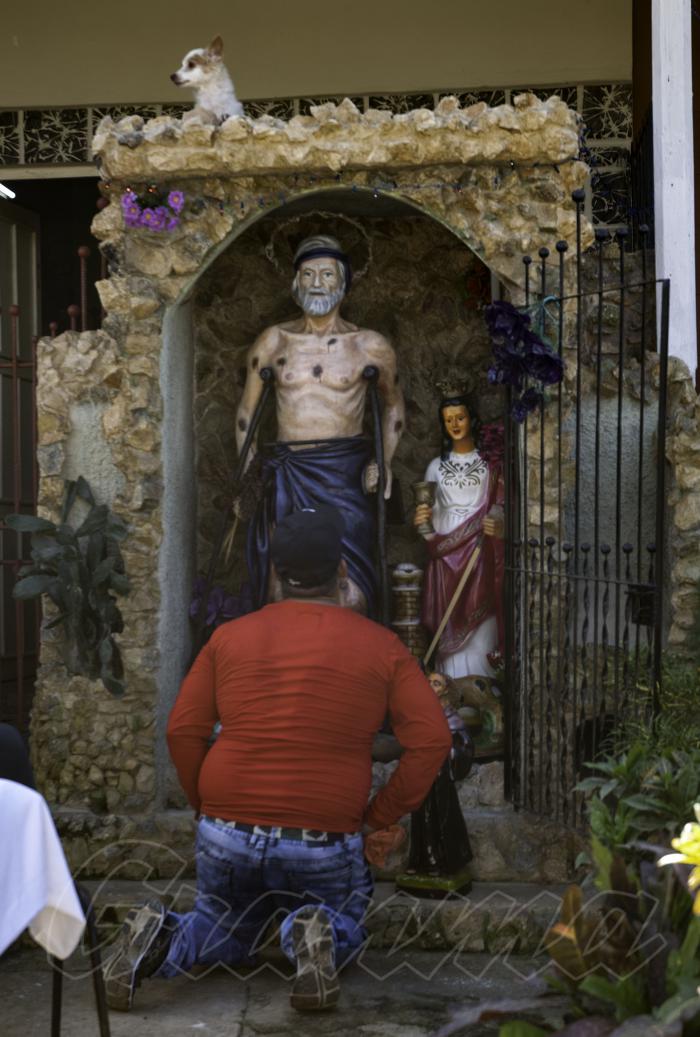
In the houses, the altars are also prepared and worshipped. Photo: Endrys Correa Vaillant
Babalú Ayé, “as he is also compared by association with believers in the Yoruba religion”, means “King or father of the World”, Shangó’s brother.
The Chinese also see in Babalú Ayé a resemblance to one of the eight immortals of their mythology, Li Xuan, who, like Saint Lazarus or Babalú Ayé, wears thick cloth rags, is crippled on one leg, helps himself with crutches and is a lover of animals.
In these days, on the eve of December 17, his day; the devotees of this saint venerate him in different ways. Some slide with a stone on their backs, others walk barefoot or with flowers and candles. What almost everyone agrees on is that they go to the National Sanctuary of Saint Lazarus in El Rincón to deposit all their offerings. Some ask for health, others for protection, or for themselves and their families.
In El Rincón we find people of all kinds, from different places in Cuba and other countries. Even the riders go with their horses to bless them (they do it on December 17 and January 17).
It is normal to see them in the strollers known popularly as spiders moving in groups of up to 20 to fulfill their task. They arrive at the Rincón and go to the fountain in search of holy water, take it to the father of the church to bless it and cleanse their beasts to rid them of all evil, it is part of the ritual.
Like the Virgin of Charity, Saint Barbara or the Virgin of Rule, Saint Lazarus, will always have in Cubans, followers who will worship him to face his challenges, calamities and hardships. Faith in him manages to cross borders and clings to those who feel it and make it theirs.
THE LEGEND
Legend has it that Babalú Ayé, being a very womanizing man, was advised by Orula to control himself in this way because he could contract serious diseases, which he did not do. One day he met an irresistible woman, went to have fun, and when he woke up the next day his body was covered with malignant sores.
The elders of the village, seeing his condition, sewed his tongue with twelve diloggún (a divinatory system of the Osha Rule that uses the cauri snail in the hand of 18 or 21 pieces, depending on the orisha in question) and expelled him from the place.
His brother Shangó took him to Orula who, after scolding him for his disobedience, advised Shangó to look for Osain to prepare a remedy with herbs that would cure the disease. Babalú Ayé had to clean himself with them, bury the ebbó (cleaning and purification work) and go to a village where he would be proclaimed king. Ogún gave him two dogs to accompany him on the journey.
Fulfilling to the letter what Orula had told him, Babalú Ayé went to look for the place that Orula had described to him. When he buried the ebbó, it began to rain heavily and the sores that had afflicted it disappeared. To his surprise, as he entered the village he realized that everyone there was suffering from a serious illness, and the villagers who saw him went to meet him in veneration. This was because according to them, the cure for their ills would come with the man who arrived in the rain. Babalú Ayé, who knew some of Osain’s secrets of healing, began to care for the sick and was proclaimed king of the place.
Note: The data taken from the book “Con bendición de todos” by the professor and researcher Valentina Porras Potts.
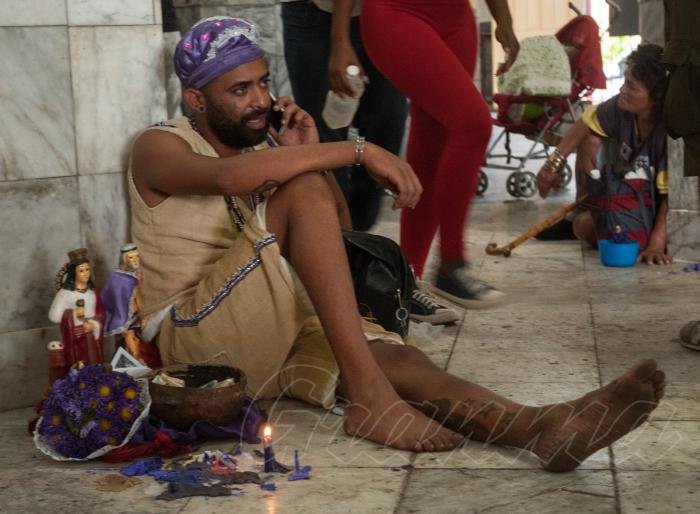
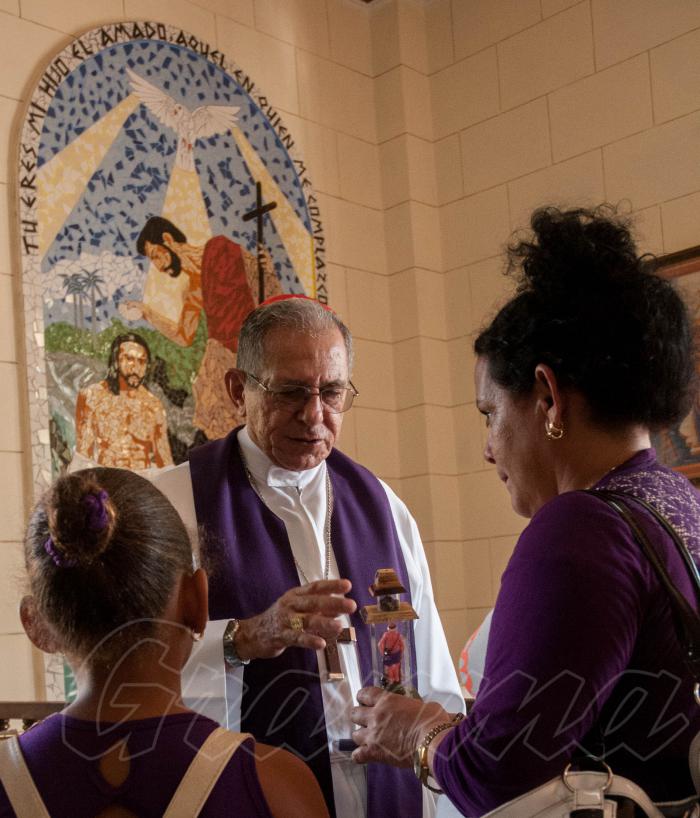
The Cardinal of Cuba, Juan de la Caridad García Rodríguez, also participates by blessing everyone. Photo: Endrys Correa Vaillant

Great effort and energy are needed to keep the promises. Photo: Endrys Correa Vaillant
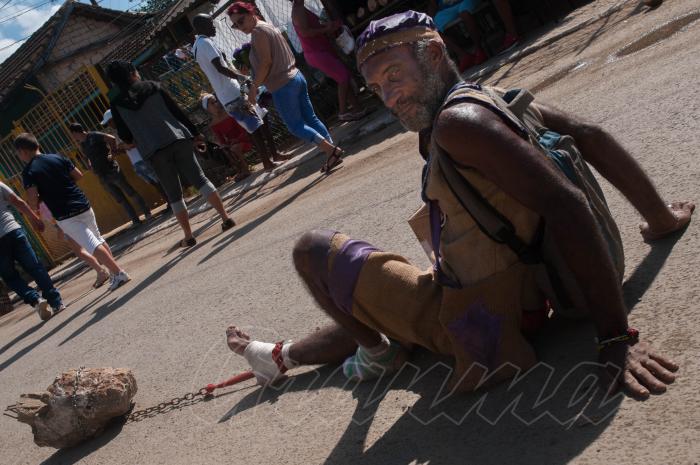
Carlos Manuel, who walked six days with that stone from Centro Habana, has been a pilgrim for 15 years. Photo: Endrys Correa Vaillant
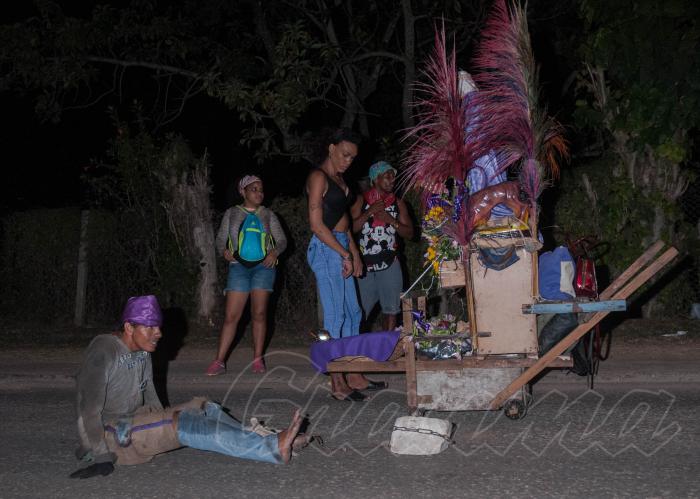
Photo: Endrys Correa Vaillant
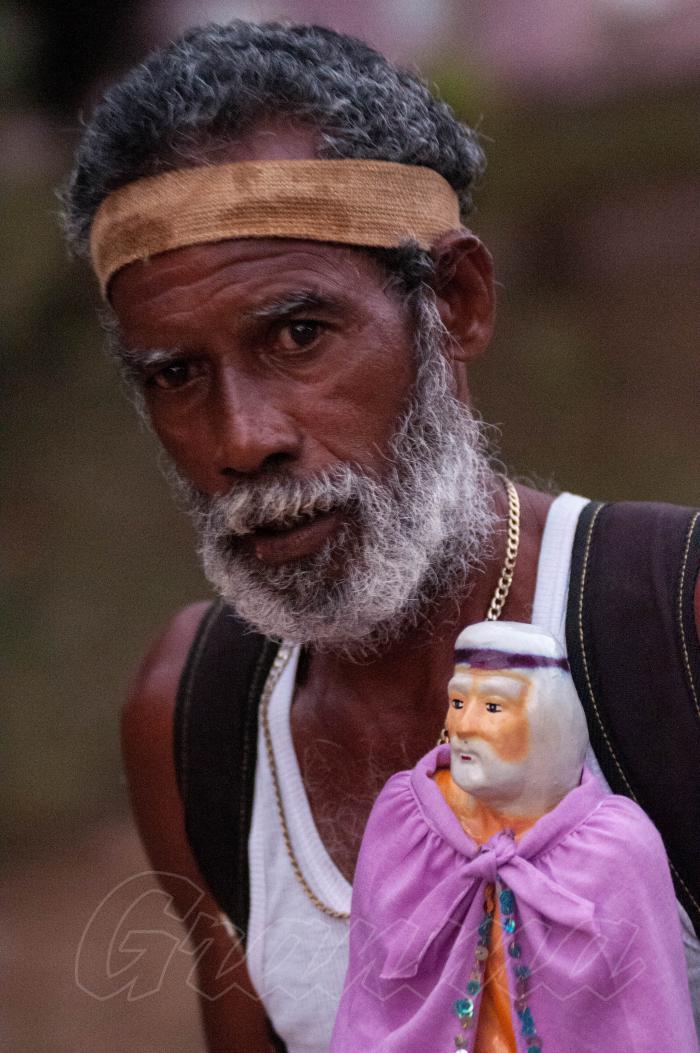
Photo: Endrys Correa Vaillant
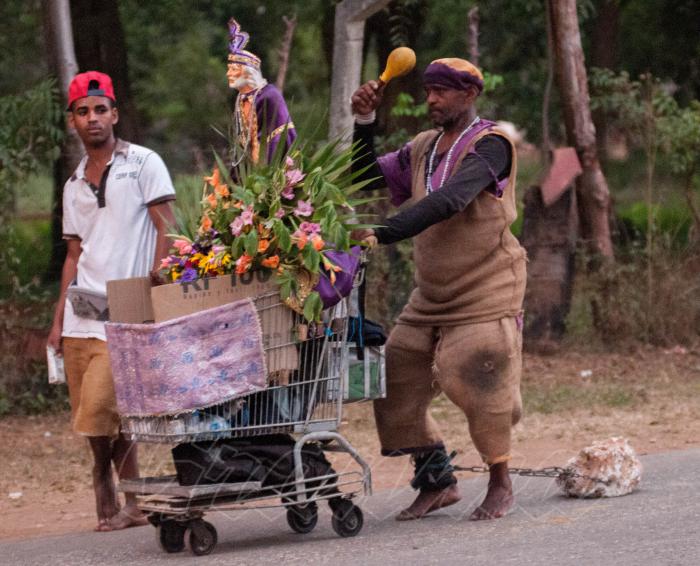
Photo: Endrys Correa Vaillant

Photo: Endrys Correa Vaillant
Agosto: A Different Film
 Agosto: A Different Film
Agosto: A Different Film
This is a film in every different sense that proposes a healing gaze towards that moment of farewells and separations.
December 11, 2019 12:12:07 | CLAUDIA PIS GUIROLA
Translated and edited by Walter Lippmann for CubaNews.

Photo: Frame of the film
It’s set in 1994 and Carlos is 14 years old. Some of his friends, neighbors and relatives leave Cuba behind the siren songs of the U.S. government. The US, which, while tightening the economic and financial blockade, promises benefits and guarantees to those who manage to set foot on American soil. In handmade boats, improvised from any material, they sail the seas: they are rafters. But Carlos (Damián González) is a teenager and in the midst of his personal pains, is unable to understand the full political-social dimension of the moment. Through his gaze, Agosto [August] is told. It is a film without excesses and with no desire to judge, which appeals to the collective memories of those who face the only Cuban film in competition in the section of Opera Prima during this 41st International Festival of New Latin American Cinema in Havana.
With the support of the Cuban Institute of Cinematographic Art and Industry (ICAIC), this production between Cuba, Costa Rica and France had to go through a long road of almost ten years to see materialize the original project of Armando Capó (director) with script by Abel Arcos. Finally, it is now possible to enjoy a work that, beyond the dramatic force of the context in which it is set, delves into more universal values such as adolescence, the loss of loved ones and the sexual awakening of a boy who will have to assume the socially accepted demands for his gender, but made even more acute by economic precariousness.
Capó, coordinator of the Fiction Chair at the International Film and TV School of San Antonio de los Baños, tells of a long documentary production (Descubriendo Pancha, 2004; La marea, 2009; Ausencia, 2011), which may have influenced the way the story is told. There are no dramatic effects or heartbreaking catharsis. Even the treatment of color from a palette without stridencies, the tempo of the edition and the use of hand-held camera contribute to achieving a story from a calm, with an unconventional narrative structure, but very attractive from, among other things, the careful recreation of the era.
With the performances of Glenda Delgado Domínguez, Felito Lahera, Verónica Lynn and Lola Amores Rodríguez, this is a film in a very different sense that proposes a healing gaze towards that moment of farewells and separations. That August was the same for many and those who still need a reconciliation with that summer, perhaps this August, will find it.
A Dose of (In)Security


A Dose of (In)Security
According to street rumors and reaffirmed specialists in Sexology and Urology in our country, in the last decade the number of young men who consume sildenafil [Viagra] without a prescription. has risen worriedly
Published: Tuesday 10 December 2019 | 11:24:12 pm.
by Mileyda Mendéndez Dávila
Translated and edited by Walter Lippmann for CubaNews.
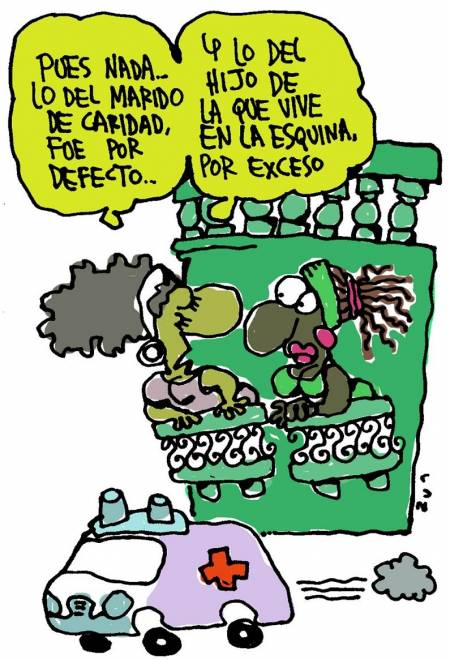
Viagra consumption Author: LAZ Published: 10/12/2019 | 10:54 pm
WOMAN #1: What happened to Caridad’s husband was for lack of…
WOMAN #2: And what happened to the lady that lives on the corner was due to an overdose.
in sex, it is fundamental to respect oneself and the other person.
Lara Castro, Spanish sexologist
Carlos is 19 years old. He studies engineering and is an attractive young man, intelligent and nice enough to arouse the interest of whomever he wants. His friends respect and support him, his relationships have been stable and his sexual life healthy, so far without surprises.
Like many young people, Carlos has felt the need to experiment to the maximum of his abilities. Even without the traumatic experiences to justify it, he decided to venture with “the famous little blue pill”, because they promised him that he would see the clouds and show them, in addition, to his roommate.
The outcome could have been magnificent, as other young people who were pleased insist on narrating, but Carlos ended up in a hospital ward with an intense pain in his penis, erect for more than three hours, and an unbearable headache. Luckily, it was enough to drain the limb with a syringe and there were no sequels.
According to street rumors and reaffirmed by specialists in Sexology and Urology in our country, in the last decade the number of young men who consume Viagra without a prescription, has risen worryingly. This is true both in its Cuban variant and products imported illegally under the name, not always reliable, Viagra.
The interesting thing about this phenomenon is that this drug is a vasodilator (dilates the vessels of the circulatory system). It doesn’t stimulate desire, and is intended for patients with erectile dysfunction after trying other therapies whose use involves fewer physical risks.
When employed by a young man who has no circulatory problems or erection difficulties, it can cause priapism, that continuous and painful erection of the penis that lasts several hours and requires surgical intervention to resolve.
Even without immediate traumatic episodes, it is a dangerous habit because it creates dependence and deepens the insecurity, low self-esteem or anxiety of the young person. In the long run, this can generate the feared dysfunction, but of psychological origin, explains psychiatrist and sexologist Elvia de Dios, therapist at the National Center for Sexual Education (Cenesex).
In addition, possible reactions to the chemical surpass the advantages that its consumption supposedly brings, if there is no basic cause, which is lack of erection. These include headaches, palpitations, facial redness, nasal congestion, dyspepsia … Added to this is that some men should not use it because they are allergic to its components or these interfere with their treatments for chronic illnesses (such as heart disease).
There are also restrictions for uncontrolled hypotensives and men with retinitis pigmentosa. This is because, according to the Cuban expert, international studies report vision damage, since this drug relaxes smooth muscles by inhibiting the production of the enzyme FDE-5 (5-phosphodiesterase) but can also inhibit FDE-6, vital for the retina.
In the new protocols of attention to sexual dysfunctions in our country (in the process of validation to be generalized throughout the health system), we insist on the rigor of the prescription of the drug, accompanied by other indications, such as its ingestion away from meals, low-fat diet in the previous hours and not taking more than one pill a day.
It is essential to demystify other aspects that young people handle inappropriately. Viagra does not protect against any STI and its use does not increase sexual appetite: without desire and prior stimulation, it does not lead to anything positive.
These insecure young people force a process that should be natural, spontaneous and pleasant for both parties, in an attempt to look good above all else. In that state, it doesn’t matter if you use alcohol, viagra or other natural aphrodisiacs: the expected effect is in your mind, even if your body suffers the undesirable consequences.
A healthy sexuality in all senses includes unlearning prejudices that point to the man as merely responsible for the sexual relationship. It takes into account that, at that moment, responsibilities are shared equally, so the only doses that must mediate between them are that of attraction and honesty.
Subscribe to Blog via Email
| M | T | W | T | F | S | S |
|---|---|---|---|---|---|---|
| 1 | ||||||
| 2 | 3 | 4 | 5 | 6 | 7 | 8 |
| 9 | 10 | 11 | 12 | 13 | 14 | 15 |
| 16 | 17 | 18 | 19 | 20 | 21 | 22 |
| 23 | 24 | 25 | 26 | 27 | 28 | |



You must be logged in to post a comment.